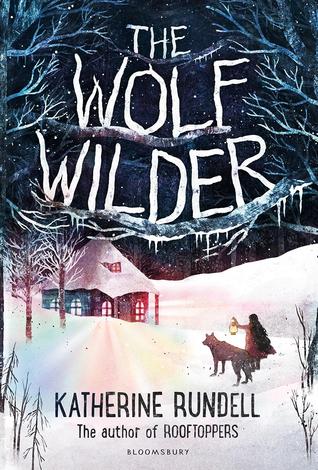Continuing the theme of Russian-related YA, I wanted to draw attention to a 2015 release that is a little younger than YA and a lot more amazing than anticipated. Very–very–loosely based on the tale of Red Riding Hood, it tells the tale of Feo, a “dark and stormy girl” who has no fear of the forest or the things that dwell within.
I’m very glad that Rundell kept her references to Little Red Riding Hood to a minimum. It’s nice to have that story make its way in along with other references, but I much prefer her new story to another retelling. (If you want a superb and more direct reimagining, try Crimson Bound, by Rosamund Hodge.) This Red Riding Hood learns how to understand wolves rather than expressing incredulity over the fact that they have teeth. She also doesn’t need a huntsman to save her; in fact, the villain is a hunter, ignorant and oblivious of the gifts of nature or the joys of a pack.

General Rakov is a pyromaniacal villain who would have seemed merely cartoonish in less capable hands. Instead he is a horribly realistic tyrant both petty and grandiose, utterly without scruples or remorse. Like all tyrants, he subsists on fear. (Quite literally, it seems at times: food and hunger feature heavily, but Rakov is indifferent to it.) The fear he creates and perpetuates is both obvious and insidious: he burns down some villages, but others he merely bilks for resources, forcing everyone to look to what they could lose instead of what they could gain by resisting.
Fortunately, also like all tyrants he sows the seeds of his own destruction. Feo is one such seed, a girl who might have spent her whole life cheerfully ignorant of politics and the wider world. After all, she is very content with her mother and their wolves. Together, the pair “wilds” wolves who were taken as pups to be pets, but who are no longer wanted by their aristocratic owners. These wolves have reached the notice of Rakov, who demands that they be curbed or culled. Feo and her mother dare to fight back, and for that they face fire, imprisonment, and separation. But Feo is not deterred. She joins up with a tenderhearted turncoat named Ilya and leads him and her wolves on a quest to defeat Rakov. And when she happens up on Alexi, a Marxist firebrand, and then upon a village sympathetic to him, she finds fertile soil in which to grow.
At first Feo is skeptical of revolution. She only wants to go her own way, and is self-sufficient enough to not need much help. But just as she eventually has to concede that she is no match for a Russian blizzard, she is also no match for the Russian army–not alone, anyway. Grudgingly at first, but then with more and more enthusiasm, she enlists the aid of Alexi, Ilya, and a gaggle of children who are drawn to her growing legend. The scale is just epic enough to touch on the archetypal, but also reasonable enough to still feel particular to tsarist Russia.
There are moments of sublime loveliness that tore at my heart. I won’t spoil them by hinting; suffice to say that they’re just the right combination of terrible and bright to really pierce you. Rundell knows how to give just the right amount of information, and leave beauty and tragedy to stand on their own, without embellishment. It’s more common in children’s literature because tales have to be told with shorter lengths and shorter words, but nine times out of ten that’s all to the good: to distill a story to its most interesting and essential elements is often the hardest thing for writers (who are, after all, prone to create). This isn’t to say that some stories don’t merit elaboration in language or subject, but to me, few things are better than the almost mythological quality of a complex tale simply told.
What I like about The Wolf Wilder is the same thing I like about most enduring children’s literature: it doesn’t hold back. This doesn’t mean it’s graphic or delights in disabusing children of their illusions. Books like this just rightly realize that there aren’t that many illusions to begin with. Many children–too many–already know that the world is brutal and unfair. They don’t want to be coddled; they want to fix it. And they don’t want to be spoken down to; they want to be treated as what they are: wild and curious and sensible as any good wolf.
Given that Philip Pullman has a quote on the book jacket, it’s impossible not to put this book into consideration with him and with his favorite nemesis, C. S. Lewis. The Wolf Wilder doesn’t have any interest in religion, but there’s no getting around the parallels that crop up when you have a young girl and a beloved animal (even when that animal is actually her own soul, or Jesus (of all the sentences I never expected to write…)). Feo is more Lyra than she is Susan or Lucy, and thank heavens for that. She’s ill-mannered, impatient, violent, and, well, wild. She knows a great deal about the customs of wolves, but so little about the manners of men that she becomes anxious when forced to interact with crowds. She’s complex and interesting, a real girl.
